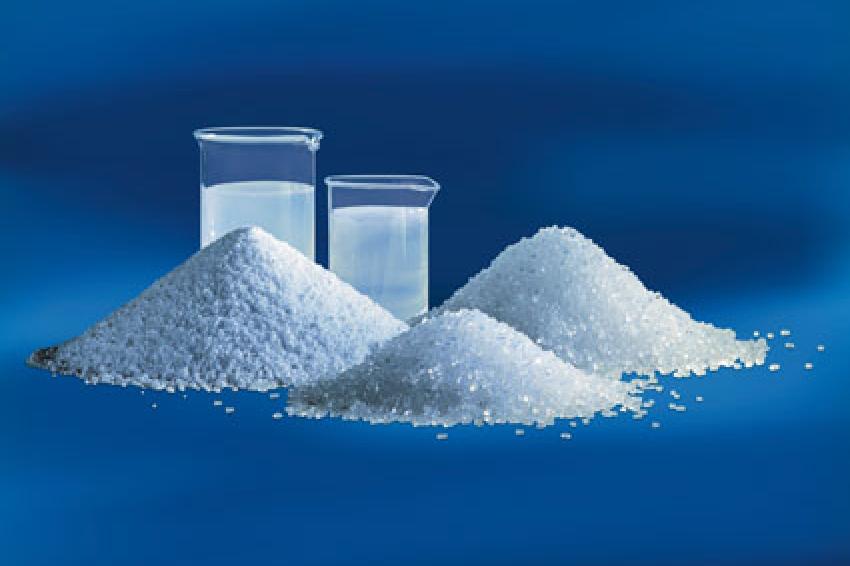PFOA-free Fluoropolymer Production
Early Complete Conversion has Paid Off
VIP-Visions In Plastics - In the political world, the 100 days review is common practice. In the chemical industry, on the other hand, longer cycles apply in order to allow the sustainability of the changes to be assessed. More than one thousand days ago, Dyneon started, as the first manufacturer worldwide, to produce its entire fluoropolymer portfolio without using Perfluorooctanoic Acid (PFOA), and completed the conversion of its processes by the end of 2008. The replacement emulsifier developed by Dyneon for this purpose equally fills two requirements: it has a significantly improved environmental, health and safety profile, while leaving the properties of the high performance materials produced with the new emulsifier virtually unchanged.
Since the 1990s, PFOA and other perfluorinated compounds have come increasingly under public scrutiny. The progress in environmental analysis made it possible to detect traces of this persistent compound in the environment and humans all over the world. They originate from a variety of applications ranging from fire extinguishants to electroplating to textile treatments. PFOA was also used as an additive in the fluoropolymer production, in the form of an ammonium salt. PFOA was thus released into the environment partially through the production of fluoropolymers and could also have been contained in the products.
Fluoropolymers are used primarily as high performance materials in automotive and equipment manufacturing, in cable manufacturing, textile architecture, the solar industry and also as a non-stick coating for cooking utensils. For the most part, they fulfill important functions for environmental protection, such as temperature and chemically resistant seals, corrosion protection coatings or fire protection insulation.
It was already at the turn of the century that 3M and its subsidiary Dyneon, a worldwide leading manufacturer of fluoropolymers, voluntarily took action to reduce their emission of PFOA significantly. A milestone was achieved as early as in 2000 when 3M announced that it was phasing out its production of PFOA. As a user, Dyneon reduced its use and emissions of PFOA in the following years by putting sophisticated recovery and recycling systems for PFOA into operation on a full production scale. With these containment and recycling technologies, the company managed to remove PFOA from all environmental media and from all products, which closed the cycle of this additive in the fluoropolymer manufacturing process. By licensing these technologies to other fluoropolymer manufacturers, Dyneon also made this state-of-the-art development available worldwide to the fluoropolymer industry.
Fundamentally Improved EHS Profile
In 2006, the United States Environmental Protection Agency (EPA) teamed up with Dyneon and seven other companies in the fluoropolymer industry to launch the global "Voluntary PFOA Stewardship Program", with the aim of reducing PFOA emissions worldwide by 95% by 2010, and of eliminating them altogether by 2015.
Already a year before that, Dyneon had started a research project with the goal of developing a replacement emulsifier with better environmental and health properties, i.e., an improved Environmental, Health and Safety (EHS) profile. After a first screening of about 40 substances, the researchers in Burgkirchen, Germany and Oakdale MN, USA, began to focus on a multi-level testing and selection procedure for the EHS profiles and polymerization properties. In an iterative process, an exceptionally promising candidate came to the forefront. The EHS profile of the replacement compound exhibits both good general properties and fundamental improvements with regard to the critical issue ofretention time in the organism. In addition, Dyneon is also employing its proven containment and recycling systems with the new emulsifier.
Unchanged Material Properties
But the company did not stop there. The new emulsifier should not lead to any significant changes of the properties of the products produced with the material. Fluoropolymer materials are distinguished by their high thermal resistance and virtually universal chemical resistance. Particularly in the automotive industry, the use of fluoropolymer materials is growing due to the constantly increasing operating temperatures of modern, economical engines. "The crucial challenge was to ensure that the new emulsifier meets the requirements of automotive manufacturers without the need of a new specification process," said Dr. Klaus Hintzer, head of Research and Development at Dyneon in Burgkirchen. "Above and beyond all positive preliminary testing, experience of the last few years has shown that the new emulsifier fully and completely meets these requirements."
Conversion Completed Significantly Ahead of Deadline
With the development of the world's first fully equivalent substitute for PFOA but with an improved EHS profile, the subsidiary of 3M was the first fluoropolymer manufacturer to implement the industry's voluntary stewardship. "In a several-step procedure, we had already in 2007 begun to convert our dispersions to use the new emulsifier," said Dr. Klaus Hintzer. The conversion of fluorothermoplastics and micropowders was completed in the first half of 2008. By the end of that year, paste products marked the conclusion of the procedure. "Dyneon has thus since 2009 been the only fluoropolymer manufacturer worldwide whose production processes are completely free of PFOA, and that seven years before the deadline given by the industry's voluntary stewardship," said Hintzer.
All practical experience of the past four years has confirmed the researchers' test results: the materials produced with the replacement emulsifier meet all of the important criteria just as before. "For our customers it is becoming ever more important that they only use products produced with environmentally responsible manufacturing processes," said Dr. Klaus Hintzer to illustrate the market trend. This is especially true for all applications where food is involved. Manufacturers of cooking utensils, for example, are advertising that their products are produced exclusively using PFOA-free materials.
Other fluoropolymer manufacturers have also begun to convert their manufacturing processes to be free of PFOA. They are doing this using their own developments and also the replacement emulsifier, which Dyneon offers under license. It is thus foreseeable that the worldwide fluoropolymer industry should be able to meet the voluntary stewardship on time - and that some will have already achieved complete conversion of their processes.
Contact
Dyneon GmbH
Carl-Schurz-Str. 1
41460 Neuss
Germany





